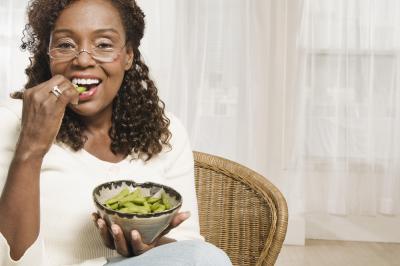Your body needs protein to perform essential functions, like cell building. If you don’t have enough protein, your body will essentially eat itself to make more by way of breaking down your own tissues, according to the Harvard School of Public Health. There’s no exact science to determine how much protein you need per day, but a good estimate is about 8 g for every 20 lbs. you weigh. You can get this protein from many more food sources than just meat.
Meat
Meat is perhaps the most common protein source in the United States. Meat gets bad press sometimes because of its high saturated fat content, but if you choose lean cuts of meat and eat fatty cuts in moderation, you can avoid the health risks associated with this protein source. Aside from protein, meat provides iron and other important nutrients essential for a woman’s overall good health. A one-half fillet serving of halibut contains 42 g protein. A one-half chicken breast serving gives you 31 g. You’ll get 29 g from a 3-oz. serving of beef round steak.
Eggs and Dairy Products
Fat-free and low-fat dairy products make for an excellent source of dietary protein. You get from between 6 and 9 g for 1 cup of milk or yogurt. You get around that much from 1 oz. of cheese as well. An extra large egg has 7 g, so if you have two for breakfast, that’s 14 g of protein. If you can’t consume dairy products, plant milks provide similar amounts of protein. A cup of soy milk has just over 8 g.
Plant-Based Proteins
Several plant foods provide protein and are the mainstay of vegetarian and vegan diets. You can incorporate them into your diet, even if you eat meat, because they’re a low-fat, low-calorie way to meet your daily protein needs. Soy foods are perhaps the most famous plant-based proteins. One cup of cooked soybeans contains more than 28 g of protein, which is only 1 or 2 g shy of the amount you get in 3 oz. of beef. Other vegetables and grains contain protein as well. One cup of wild rice contains around 7 g, as does 1 cup of frozen spinach or 1 cup of shelled peas. A cup of broccoli contains close to 6 g. Legumes, like beans ad nuts, round out the vegetarian protein profile with their high levels of this essential nutrient. A cup of cooked lima beans has nearly 12 oz., and 1 tbsp. of peanut butter has just more than 4 g.





